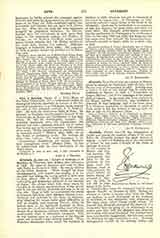

Alvarado, Pedro DE. —Of the companions of Cortez, and among the superior officers of his army, Pedro de Alvarado became the most famous in history. A native of Badajbz, son of the commander of Lobon, he was made a Knight of the Order of Santiago in reward for his exploits in Mexico and Central America. He accompanied Grijalva on his exploration of Yucatan and the Mexican coast in 1518, and was the chief officer of Cortez during the conquest of Mexico. As such, he was left in command of the forces at Tenochtitlan, when the conqueror had to move against Pamfilo de Narvaez in 1520. During the absence of Cortez it became clear that the Mexican Indians, to avail themselves of the weakness in numbers of the Spaniards, were preparing to fall upon them before Cortez could return. To forestall this, Alvarado, warned of the character of a ceremonial that was going on, as preliminary to an attack upon him, took the offensive, and dispersed the Indians with some bloodshed (the numbers have been considerably exaggerated), but this only caused the Mexicans to begin hostilities at once. Alvarado distinguished himself by his military ability and personal bravery during the disastrous sally of Cortez from Mexico in July, 1520 (Noche Triste) and subsequently in the campaign and capture of the Indian stronghold (1521). In 1524 he conquered Guatemala, and became Governor of the Spanish province into which the territory was transformed. He soon undertook to fit out expeditions to the South Sea (with little result), and determined upon following Pizarro in the conquests of western South America. Sailing to the coast of Ecuador in 1534, with a well-equipped flotilla, and landing on the Ecuadorian coast, he pushed on to the plateau of Quito, to find it held by Belalcazar for Pizarro. Bloodshed appeared imminent between the rival parties. But the arrival of Almagro with instructions from Pizarro led to negotiations, as a result of which Alvarado returned to Guatemala, having bartered to Pizarro most of his ships, horses, and ammunition, as well as most of his men, against a comparatively modest sum of money. After his return to Guatemala, Alvarado turned his attention to northern Mexico. Constantly quarrelling with Cortez, he easily became the tool of the Viceroy Mendoza. He was in almost unceasing trouble with his neighbor Montejo about the boundaries of their respective territories. While pursuing the pacification of Guadalajara, as lieutenant of Mendoza, he was killed in an assault on the Indian camp, on the rocky height of Nochiztlan, June 24, 1541. His wife, Dona Beatriz de la Cueva, lost her life in September of the same year, in the destruction of the city of Guatemala by the volcano called “de Agua”. Alvarado was not a gifted administrator; in fact, he was more distinguished for chivalrous bravery than for intellectual gifts. Physically very prepossessing, brave to excess, he was mentally greatly inferior to Cortez and to Nuno de Guzman, while morally their superior. What is told of the outbursts of cruelty with which he is charged cannot surprise, when the methods of warfare prevailing in his time are taken into consideration. He acted under the pressure of military necessity, and it is always well to test such charges by inquiring into their possibility and into the spirit of their authors. In estimating his conduct in South America we must remember that Alvarado was utterly helpless in presence of the superiority of Pizarro.
AD. F. BANDELIER

